
TUESDAY, FEB 19, 2019
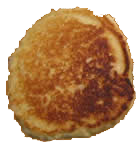
Human Chow
It's got what hu-mans crave
Eric Lee, A-SOCIATED PRESS
"Seek out the condition now that will come anyway." —Howard T. Odumref
"A man is rich in proportion to the number of things he can afford to let alone...
The price of anything is the amount of life you exchange for it." —Henry David Thoreau
TOPICS: BRAWNDO, FROM THE WIRES, ENERGY ENOUGH, WARM ENOUGH, DIET FOR A SMALL PLANET
Abstract: Ecomanna is a dry processed food that could be a staple food of the future where transportation is low-power and limited. The composition would vary to match available food resources.
COOS BAY (A-P) — Energy is required to maintain homeostasis. For all organisms, the rest of life, the universe and everything are details, though for those who reproduce sexually, the sex thing is the number two concern. David Suzuki was once giving a public lecture and mentioned that humans are animals. He little expected the protestations during the Q&A, the indignant raised voices and grim expressions of certitude that humans are NOT animals. He was soon educated. As increasing numbers of humans are now realizing, the earth is flat also.
In some climates, such as where and when humans evolved, clothing and shelter are optional. Food is not. Water isn't either, nor is a place to stand (or sleep, hunt and rummage about in and procreate, aka environment), but humans won't be living anywhere long where there isn't an area to stand that doesn't contain enough water, so water or ground underfoot was rarely in short supply until recently. Food often is, as if there is on average an abundance of food, population increases until there isn't. Humans, except for later-day humans living in industrial society (for a time), knew days when the needed food (for long-term homeostasis) was not available. Not having enough of preferred foods was the norm (until recently).
Not having enough for days, weeks, or even months was common. If the time before shortage was abundant, which was also common such as during the summer and fall of the year; if the people (and other animals) were well marbled and layered in fat, humans could go for a month or more without eating more than a hundred or so calories a day provided the intake included enough macro and micro nutrients (e.g. via geophagia, corporphagia) to maintain electrolyte homeostasis as the body can readily convert fat into calories via ketolysis. Some humans in complex societies would fast for extended periods to impress those who didn't realize that doing without three meals a day was trivial and unexceptional to their ancestors.
Having enough is a need. When body fat is exhausted, starvation begins, the body consumes itself for energy and death follows as a matter of course. Maintaining all the choices found in the aisles of a supermarket, and having enough money to buy all you might want is not a need. For those not self-sufficient in food production, a food market is a need. That the market might contain processed foods is a want, not a need. Not having servants or slaves to prepare one's food is not a need, though it may well be a want. Having energy slaves to prepare your food in a factory or in your home is not a need. Doing something when not preparing food that enables goods or services to be produced/exchanged, with or without money, for unprocessed food is a need for those who do not produce food, such as in an agrarian society complex enough to support hierarchy and specialization.
A doctor or a nurse may benefit others and can if directly or indirectly supported with food (and in some climates with shelter and clothing). If some specialize in making clothing, etc., then a complex economy is an emergent condition. If hierarchy and specialization are minimized to needed products and services, and humans know their wants from their needs, then investment in complexity may be sustainable. If wants are maximized, then the growth in short-term prosperity gives way to overshoot and descent as day gives way to dusk and the long dark night.
So food is a need, processed foods in endless variety and amount are not. Then what would a staple food in a complex society look like? Well, in ancient Egypt it was bread and onions. There were condiments and some variety of foods, more than actually needed, but those who built the pyramids were empowered by bread and onions. Whose bread (and onions) they ate, their song they sang while building their pyramids, just as those serving industrial society (i.e. who make money) do. Elsewhere it was maize, rice, potatoes, yams, sorghum, rye, emmer wheat, einkorn wheat, barley, peas, lentils, squash, soy and other beans, vetch, amaranth, chickpeas, oats, millet, manioc, cassava, and flax that fueled empire-building from chiefdoms to nation-states (for a time).
Assume a complex society prosperous enough to support its citizens as the millennia pass. Assume a neighborhood market that supplies such produce as can be produced locally when in season, e.g. vegetables, fruits, nuts and such animal products (eggs, milk, meat) as the agroecosystem supports. Assume some trade between regional markets such that dry goods in the form of grains, seeds, and such foods as can be dried to reduce weight and last through slow transport by sea under sail and wheeled wagon/travois over land at high energy cost, whether moved by man or other animals. Assume the market provides wheat, corn, rice, chipped or flaked dried potatoes, oats, and a few other grains and seeds. Assume some powdered milk and baking powder is available, along with locally produced oils/fat and eggs.
If so, such wealth would be the envy of most of our ancestors. Assume the wealth is such that cast iron skillets and pots are common. Assume the area provides enough biomass fuels or sunshine to cook foods. Assume those watersheds unable to produce staple foods produced goods to trade for them, such as those who can grow cotton or who are living by the sea that enables them to produce salt and dried fish for trade with the uplanders who grow cotton. There could be a world with ecomanna enough for a population managed to remain within the limits of environmental productivity, and thus humans could live long and prosper within self-imposed limits.
Perpetual stews, pottages, succotash, soups, porridge, brewet, egerdouce, mortrew, mawmenee, blancmange, blance dessore, frumenty, pondomenast, and what's-in-the-pot have been staple meals from antiquity and may be again. Before empire-building complex societies, suicide was such a non-issue that nothing is known of this pathological behavior. While I definitely believe "in the ignorance of experts," about all any can say of suicide before humans gathering into teamingly complex societies that have all collapsed, declined, or "faded away," is that among pre-anthropocene enthusiasts suicide was "extremely rare," i.e. was virtually unknown such that no book are or can be written about pre-civilization suicide rates.
How to make Ecomanna
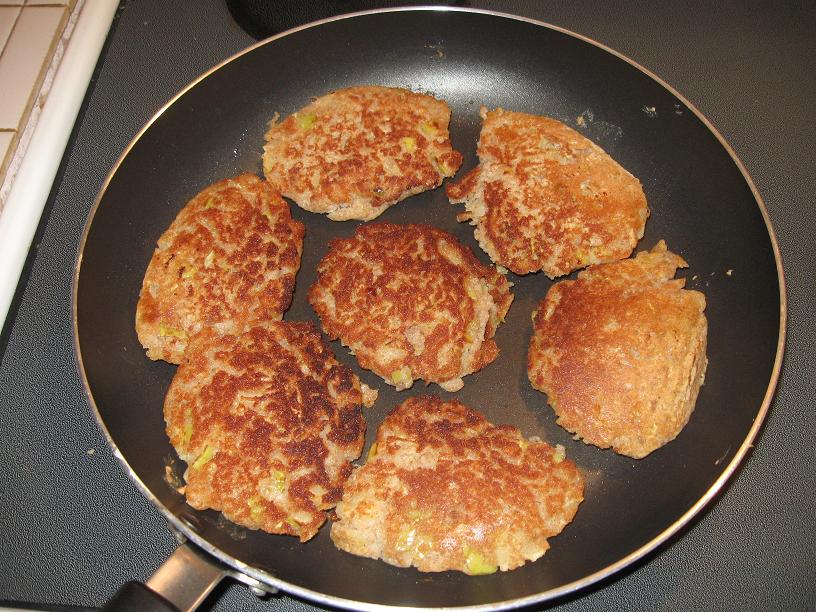 Given the assumed high level of prosperity and a local food market offering locally produced and some unprocessed imported foods, start by grinding the grains. Mortar and pestle work, as do grinding machines with rotating handles. Water, animal, and wind powered mills work in places at times, but human power is enough, and enough is enough. Combine ingredients per volume measurement to be stored as a dry mix. Assume a portion size of one cup (8 fl oz or 236.6 ml) of mix.
Given the assumed high level of prosperity and a local food market offering locally produced and some unprocessed imported foods, start by grinding the grains. Mortar and pestle work, as do grinding machines with rotating handles. Water, animal, and wind powered mills work in places at times, but human power is enough, and enough is enough. Combine ingredients per volume measurement to be stored as a dry mix. Assume a portion size of one cup (8 fl oz or 236.6 ml) of mix.
To make the mix using currently and readily (for a time) ingredients, start with:
- 2-3 cups wheat flour (whole or white or both)
- 2-3 cups cornmeal or masa harina
- 1 cup potato flakes
- 1 cup oats (instant or old fashion)
- 1 cup powdered milk (or Nido or coffee creamer)
- 1 cup sugar (white, brown)
- 2 tsp salt (0.042 cups, 10 ml)
- 0.25 cup baking powder
- 0.25 cup oil (fry in the oil or add if baking)
- 1 egg per serving added with water before frying and oil before baking
Makes about nine 1 cup servings providing about 950 calories per serving with 1 egg, oil, and other add-ins. If a day of heavy labor is planned, serve with a cup of country gravy (360 cal + 950 cal = 1,310 cal/breakfast).
Add-ins:
- chopped onions to build pyramids
- chopped vegetables/fruit
- chopped mushrooms
May top with:
- Beans
- Country gravy
- applesauce
- syrup
- jelly
- peanut butter
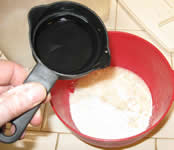 To make fry bread, add water to make a stiff batter that will drip in blobs off a spoon so as to be about 3/4 of an inch (20 mm) thick after fried. Extra may be saved for lunch or dinner. Split and make sandwiches, or crumble and add to soup/stew. May bake, cool, slice for use within a few days or crumble and dry to make cereal that can be stored long-term or seasoned (e.g. with Cajun seasoning) to make a snack food.
To make fry bread, add water to make a stiff batter that will drip in blobs off a spoon so as to be about 3/4 of an inch (20 mm) thick after fried. Extra may be saved for lunch or dinner. Split and make sandwiches, or crumble and add to soup/stew. May bake, cool, slice for use within a few days or crumble and dry to make cereal that can be stored long-term or seasoned (e.g. with Cajun seasoning) to make a snack food.
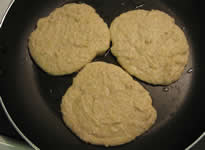 A diet of ecomanna only, without add-ins or eggs, would eventually create issues, but it would serve as a staple food. Other flours of grains or nuts could work such as flax or almonds as available. The idea is that unprocessed grains and dry foods store and could be transported over long distances.
A diet of ecomanna only, without add-ins or eggs, would eventually create issues, but it would serve as a staple food. Other flours of grains or nuts could work such as flax or almonds as available. The idea is that unprocessed grains and dry foods store and could be transported over long distances. 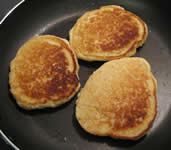 It may be possible to maintain a global economy that enables trade in grain and dry foods. Currently food going into an American's mouth travels on average 1,500 miles. The less food transported the better. If wheat and corn were distributed widely, along with baking powder and some other grains, dried potato and milk, then humanity would be empowered to live long and prosper, to learn to love and understand the universe and even one another and all life on the planet.
It may be possible to maintain a global economy that enables trade in grain and dry foods. Currently food going into an American's mouth travels on average 1,500 miles. The less food transported the better. If wheat and corn were distributed widely, along with baking powder and some other grains, dried potato and milk, then humanity would be empowered to live long and prosper, to learn to love and understand the universe and even one another and all life on the planet.
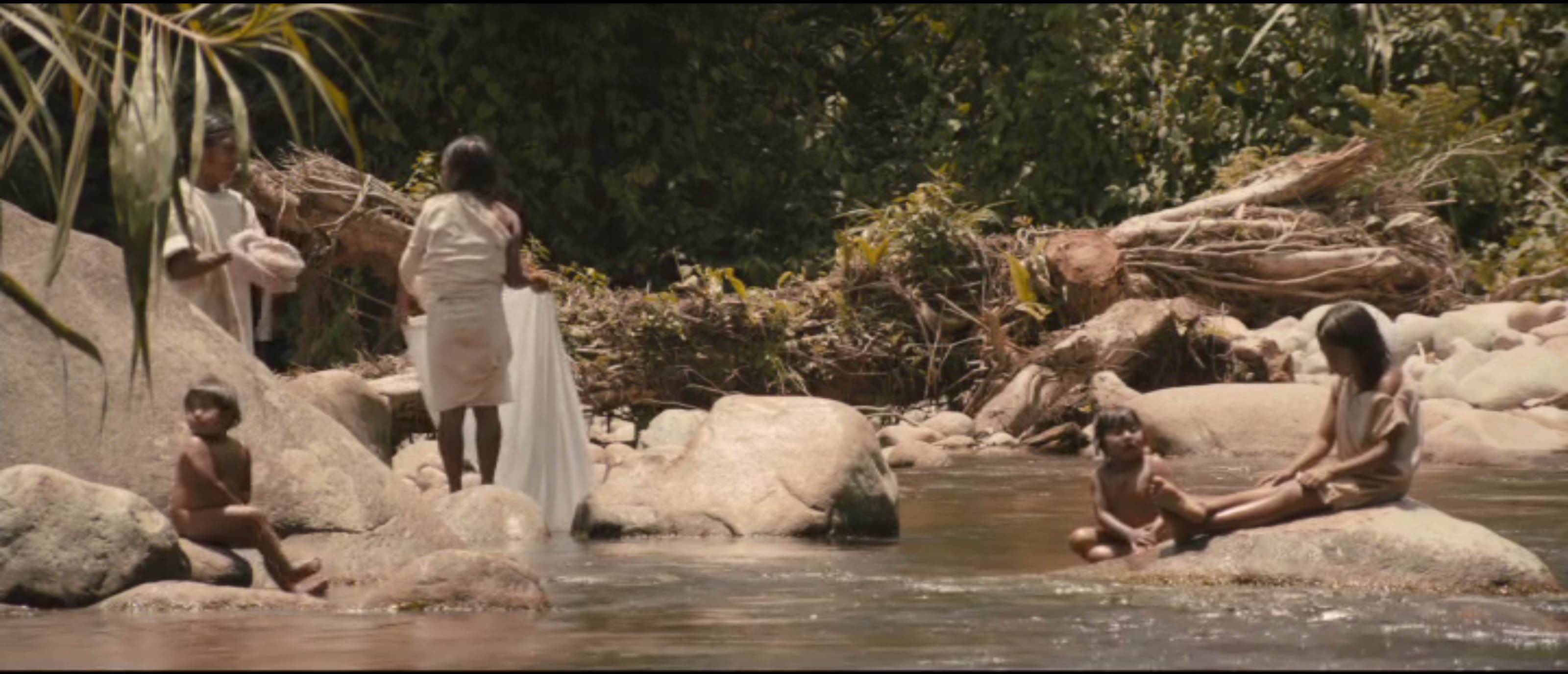 Envision humans maintaining a viable equilibrium between Man’s demands and Nature’s resources as the millennia pass,... or that humans go extinct. Envision rapid depopulation of humans, their livestock and pets first.
Envision humans maintaining a viable equilibrium between Man’s demands and Nature’s resources as the millennia pass,... or that humans go extinct. Envision rapid depopulation of humans, their livestock and pets first.
The Never Ending Stew aka Perpetual Pottage
Perhaps conspicuously absent from ecomanna is rice, the grain that empowered empire-building in east Asia for millennia. Rice could be turned into flour and some added to ecomanna, but that involves over-processing, and ecomanna, other than eggs, milk, and perhaps lard, is lacking in animal products. Assuming that livestock is part of an agroecosystem, then when livestock die, perhaps secondary to being killed because they are no longer productive, such as hens who no longer lay eggs or oxen who can no longer pull carts or plows, then how would rice, root crops, and meat be part of the hopefully never ending food supply for humans? (Note: If the population of humans, livestock, and pets is managed to remain well within environmental productivity, then Mother Earth can supply human needs (but not wants), enable humans to prosper and thrive for eons until as a Red Giant, Sol makes the planet too hot to inhabit in 10e7+ years.)
Envision a prosperous world in which posterity can cook once a day using the sun directly or indirectly as biomass. When nighttime waxed cool, then a morning fire could both warm one's big enough home (aka tiny house) and cook ecomanna for breakfast with leftovers for later. A wood cookstove's entire surface becomes hot and water could also be heated for bathing. There would be stovetop space for a stew pot. The contents could contain leftovers from the day before plus any uncooked items recently added. Even in warm climates microbes colonizing a pot of previously cooked/boiled stew would just barely be getting started within <24 hours of it becoming cool enough to allow growth (<60 °C, 140 °F). If not eaten before being reheated to boiling (or >60 °C), then any endotoxins that any nasty bacterium (e.g. Clostridium botulinum) might produce would be denatured by the heat and be safe to consume (and any dead bacteria would not alter the flavor, though the imagination of some could be altered).
Of course eating stew after a hearty enough meal of ecomanna would lack appeal and be pointless even if possible. So once the pot boils, it would just be set inside an insulated box or wrapped in a blanket. It would still be warm for dinner. But wait, let's go all decadent and demand a HOT meal. Yell loudly and shake your fist in rage at any proposal that truly civilized hu-mans settle for less than TWO hot meals a day. Being a techno-optimist and enthusiastic citizen-engineer, I can offer a solution the more adaptive (who could eat merely warm food) will not need. But for the comfort-food challenged there is the PC (pressure cooker). Seals fail and depend on replacements, so just say no to rubber seals. Go with a pressure cooker that uses a metal to metal seal. Pressure cookers reach temperatures of 121 °C (250 °F) whether at sea level or high on a mountain slope, allowing for a world of egalitarian cooking. Once at that temperature, an insulated pot full of stew from late morning would still be hot (>60 °C, 140 °F) for even a late dinner. So, bitches, NO REFRIGERATION needed in an ecolate society.
But if I, the only hu-man who truly matters, can't have my scotch on the rocks when I want it, then life won't be worth living. So I plan on living near a hydroelectric dam so some of its gigawatts can provide me with the necessities of life (civilized that is). The rest of you "animals," as you seem to think of yourselves, can just rub two sticks together if you think its cool inside your hovel (assuming you believe in shelter or cooking).
It is possible to cook in an insulated box with a glass window that allows reflected sunlight in. Evacuated glass tubes, with the inner tube being black, also reach high enough temperatures (80-200 °C). Since any temperatures over 71 °C cooks food, a couple of old tires stuffed with straw, stacked, and covered with glazing (old window glass), will slow cook the contents of a covered pot inside. Of course every day is not a sunny day, even in deserts (maybe 300 days of <30% clouds a year, US average being 205), but other than places like Juneau AK with 86 days of very low in the sky sun per year, most humans could solar cook more than half the time, using biomass cooking as a backup. In Coos Bay OR with 186 sunny days a year (50%), biomass cooking on a wood cookstove inside works through the cool rainy winters, and solar works during the dry and sunny summers when the home doesn't need to be heated. What more could humans crave?
So what goes in the pot, pressurizable or not? Well, those lucky few living by the sandy sea can occasionally rake up a small bucket of sand crabs in a few swipes, rinse, and add them to the pot to later eat, shells and all, in the stew made in heaven (i.e. by Sol—but for whom the only life would be around thermal vents in the deep sea). Those who practice vermiculture when not sharing with their mutualist chickens and other avid partakers (or going fishing), can add their annelid benefactors to the pot. Other bits and pieces from the garden or butcher block can be added too. Assuming you have some goods or services to sell/trade for stuff, you could have rice to add to the pottage, even in the desert. Those blessed to have a pressure cooker can even cook chicken bones to soften them for snacking on. The PCed could also can foods for home use, to gift, and to sell at the farmer's market.
In an egalitarian society, only those using a PC to provide a community service, such as gifting or selling canned foods, would possess such high-technology. Some would-be politicians may clammer for "a PC in every household" and make promises, but the technocrats would explain that global production is limited; would explain that the entire output of one hydroelectric dam is used (for a time, as the dam has a life expectancy of 400 years) to power the PC factory that makes 900 pressure cookers per day. Still, given that PCs with metal to metal seals are designed to last for centuries, the Federation plan is that in 400 years all families in the sustainable world to come (up to 10e7) will have a Fed PC. Humans don't get a vote, other than in matters of preference, and so those who used to be politicians, salesmen, priests, and other oversellers of and would-be advocates for HUMAN demands are ignored or offered therapy.
The Never Ending Loo
No consideration of food issues would be complete without envisioning what happens to the ecomanna/pottage staple diet as output, given that there is no "away" to flush it with drinking water as is the near universal custom in industrial society. As the Federation is alternative, what would urine and feces resource recovery be like? Inquiring humans want to know. For mass use, a composting humanure latrine would work using a compose cover which could be the finished composted humanure.
For personal use, an alternative to a complex sewer and sewage treatment plant is needed. Urine is normally sterile and is a dilute fertilizer. As long as not over-applied to one area, over-fertilizing it, soil has been urinated on since long before the first dinosaur piddled on it. Soil contains bacteria that produce urease, an enzyme that turns urine into a nitrogen source and fertilizer for plants. Urine can and for the most part should be collected separately from feces, and added to the compost pile or poured on soil.
For anything but sterile stuff, digging a hole or turning a rock over, pooping in to hole, and covering it works in the woods, but anywhere near permanent habitations, too much of a good thing is problematic as rainwater can spread disease organisms from shallow high density deposits. Chamber pots and outhouses are traditional, work, but clever apes are endlessly inventive and alternatives are to consider. Envision a pot, about the size and shape of a 5-gallon bucket (which could be a 5-gallon bucket) on the bottom of which is a "nest" shaped cover of compost material. After each defecation, add a scoop of moist compost around the sides with some covering the poo. If too dry, some urine can adjust the moisture level of the compost as long as pooling in the bottom is avoided. When the compost is added and reaches the top, take the container to the outdoor compost pile. By maintaining a conical depression, the feces doesn't touch the sides of the container, minimizing cleanup to perhaps a rinse.
Envision a compost bin with sides forming about a cubic meter area or a bit larger (e.g. 4" x 4' x 4'). If completely empty, envision a nest-shaped layer of compost. Add the contents of the smaller loo/container to the middle of the big loo composter and cover with a bit of compost or other carbonaceous material (e.g. leaves, weeds, straw, sawdust). The sweet rule of composting is add manure and other waste foods into the compost and not on top of the compost pile. Yes, there are details, but enough said.
Oh, one more issue. If, through a super-human level of foresight intelligence, you have a spare room full of toilet paper, then when it runs out, then what? The question is equivalent to asking what humans did before they became like Americans? What did the Romans, et al. do? Inquiring humans want to know, as do Federation scientists/engineers. Envision a vase with a broad base so it is hard to turn over. It is about half full of super-saturated salt water made by adding NaCl to water until there is some that can not dissolve. The aqueous environment is even more salty that obligate halophiles can take. The top of the vase narrows and is plugged to prevent evaporation. Through the plug is a stick forming a handle. The other end is in the brine and covered with a durable fabric material that only an anal area could love. It is of a diameter such that after the first wipe, it can be rotated and used to wipe again, or even again. For the truly anal, each person using the home loo could have their own personal vase.
Details matter. After the wiper has set in the vase for some hours, any fecal material in the brine would settle, and a bit of swishing removes any still on the wiper. Raising the stick above the brine and flipping it about removes excess brine. At some point the level of sediment needs to be lowered. The brine would be decanted and the sediment put where no plants grow to be diluted by rain run-off. Some salt is lost, but some can be added as the oceans of the world can afford to give up some salt for a time given that eventually it will get it back. Evaporating ponds filled with salt water and trading salt for other commodities is a sustainable industry. Trees can be turned into TP, but are a limited resource having better uses.
